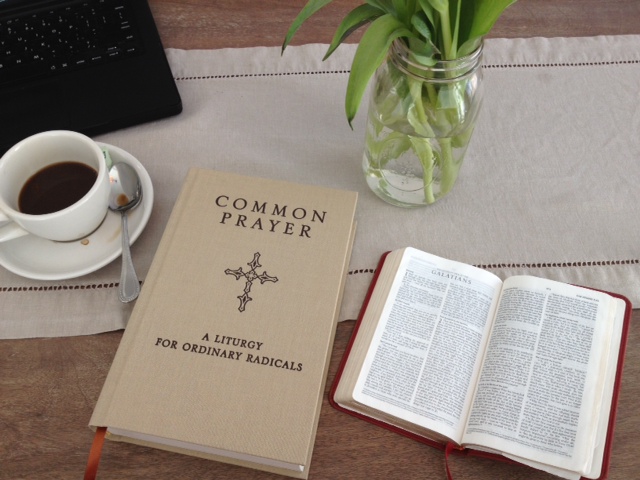Seven years ago, when we opened the doors of our now-closed intentional Christian community house, I was unfamiliar with the power of liturgical, call-and-response prayer. Growing up in a southern, evangelical church, it seemed so stagnant and lacking of sincerity as the Sunday morning crowd gathered to recite words that dead men had written. I was skeptical, at best, of its role in our communal life.
However, at the time of our house’s beginning, those whom I considered to be leaders in the New Monastic space were not only prioritizing daily liturgical prayer in their own contexts, but they were crafting ancient words and rhythms into new, relatable content. Our home began praying Shane Claiborne, Enuma Okoro, and Jonathan Wilson Hartgrove’s Common Prayer: A Liturgy for Ordinary Radicals every morning at 8am as the coffee percolated in our common kitchen and neighbors walked through the lopsided front door to settle into the round.
Mismatched candles on the center table complimented the mismatched furniture that collected with time and move-outs. Eventually, we carved out a culture of silence prior to praying in which only new babies would cry, spoons would clank around mugs, and participants would breathe until the opening line was read.
Oh Lord let my soul rise up to meet you
As the day rises to meet the sun
I had no idea what parts of my soul were building up within me as we prayed the same words together morning by morning. I had no idea that I was connecting through time and space to people who would come and go and become a piece of me in between.
Expanding our experience of liturgy into one that could speak to the issues of our actual world and infuse us with resources for a practical faith — as crafted by the book’s creators — began to redefine the practice of call-and-response worship for me. With the words written for, held, and shared by all participants, the pressure of performance-driven prayer could be taken off the table. The scripture reading would rotate around the room, and a community member would lead us in song which echoed through the halls that held the rest of the week’s life.
During the Prayers for Others section, we’d lift up the teens in the after-school program, our family members going through treatments, the peace march that was only a week away and the drive-bys that instigated it. We’d shoulder together the hard conversations had with parents and preachers, pray for much needed jobs and much needed sleep. We’d cringe when something odd was possibly over-shared and laugh until we’d have to be wrangled back in by the Lord’s Prayer.
Our Father . . .
When two years ago — for complex reasons — we shut the doors to the house and shifted our reality more than was realized at the time, I wondered what parts of our existence would rear their heads most potently in my grief. Would I miss the way we would garden the cilantro when we were working out conflict? Would I miss the built in time for porch visits? The discussions about faith de/re-construction? The comradery of a village living connectedly between two blocks? The purpose with which our mundane moments were still drenched? Would I miss the integrated growth or the stress that accompanied the fight for boundaries? Would I miss the harmonies into which the hymns would divide, stirring our hearts for belonging to each other?
All creatures of our God and King
Lift up your voice and with us sing
Oh praise ye, Oh praise ye
Alleluia, Alleluia, Alleluia
This morning, as I cracked open my copy of Common Prayer, which I have sorrowfully avoided for over a year, my eyes filled with tears as I was transported back to our old living room. Spoons clanking, people breathing, spirits joining with one another and those gathered all over the globe just like us. Though I was once someone who so vehemently rejected liturgical prayer, I was taken aback, not only by the gift that it once was, but by the gift that it has grown exponentially to be. Like a steady trickle of water that carves a canyon, I was bound to a people and a place through the gift of daily, communal prayer. I feel it connecting us still.
So as I sit here reading alone the words to which we’d return every January, longing for the gift that was beginning a day centered and together, I am remembering . . .
Liturgical, call-and-response prayer is powerful.
It is often doing more than we realize in the moment.
It is only one coffee pot, invitation, chosen-time away from being shared.
And there are resources to help us.
I’m thankful that the writers/compilers of Common Prayer answered a call that gifted me with an experience I have yet to shake and that I continue to need. Not everyone will share dishes and mismatched furniture, cilantro beds, and covenants of intentional Christian living. But we can find a small group of people who are willing to gather once (or multiple times) a week to bless each other in the joining of spirit and voice.
I pray that — for those who lack and desire it — we find people with whom we can pray:
May the peace of the Lord Christ go with you : wherever he may send you;
May he guide you through the wilderness : protect you through the storm;
May he bring you home rejoicing : at the wonders he has shown you;
May he bring you home rejoicing : once again into our doors.

